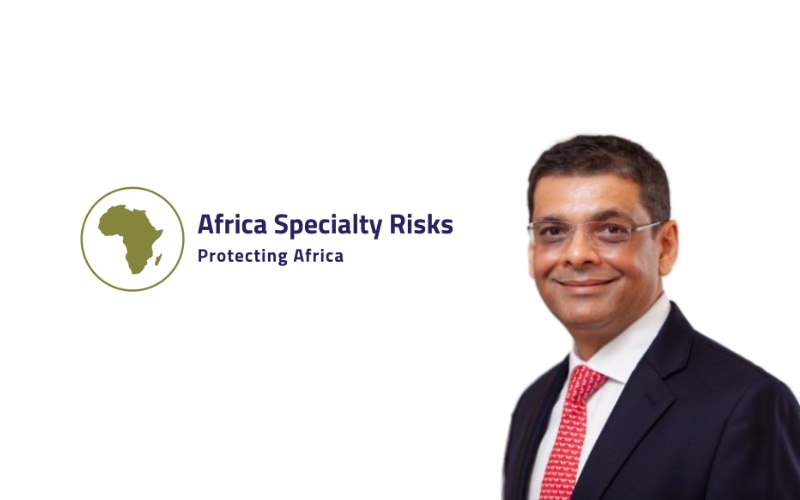‘Consistent capacity’ is needed to help close protection gap in Africa: Shah, ASR CEO
- August 9, 2025
- Posted by: Kassandra Jimenez-Sanchez
- Category: Insurance

As a developing Continent that is seeing increased interest in business investment, Africa presents growth opportunities for insurers and reinsurers, Mikir Shah, CEO of Africa Specialty Risks (ASR), said in a recent interview with Reinsurance News.
At the same time, there is a shortage of insurance capacity across the continent, which contributes to Africa’s protection gap, the disparity between economic and insured losses after an event. But as explained by Shah, re/insurers like ASR are working to help close this gap.
Shah said: “Reinsures and insurers are now looking for growth. I think we’ve got to a stage where the underwriting has been refined, and where the underwriting standards can be held. Now, growth is more in focus, and where is that going to come from? I think that markets like Africa, which are developing, will offer the strongest growth opportunities.
“On the corporate side, there has been a real positive shift in the thought process around Africa. Corporates understand that Africa represents a huge growth opportunity, and they want to access that. For example, the Africa Continental Free Trade Agreement is the best way to access the Continent now. It has been signed by 51 of 54 countries and offers tax-free and barrier-free trade, be it financial or non-financial between these countries, for locally produced goods.”
He explained that in order to access Africa this way, corporates need to put some manufacturing on the continent to service the growing population with local products, thereby developing local markets.
“So, we are seeing an interest from corporates looking to invest in manufacturing across the continent and they invest in businesses across the region as well,” said Shah.
One of the main hindrances to insurance and reinsurance market growth in Africa, noted Shah is the substantial shortage of capacity. On occasion, there may be fluctuations in capacity availability, however, what is really required is consistent capacity.
“There’s still a shortage of capacity that is contributing to the protection gap in the continent and we’re trying to fill that gap. We’re trying to close that gap, with ourselves, our existing partners and new partners that will join in the future.
“At the same time, we aim to provide risk mitigation to help toward the investment into and across Africa. Sometimes you see more capacity coming in and going away, but what we need is consistent capacity,” the CEO stated.
Adding: “ASR looks to add more capacity at the front end from new partners, who would be joining existing partners. We have ample opportunities, good quality business that meets our underwriting guidelines, and the right pricing models. So, when we have a risk come through, we will be able to deploy more capacity and make more of a difference to the growth on the continent.”
The re/insurer’s use of parametric solutions is one of its main tools to help towards growth in the continent.
“Corporate specialty insurance has been widely available in developed markets for hundreds of years, but across Africa, it has not spread in the same way. The knock-on impact of that, is that there is a shortage, I would say, of loss adjusters for traditional insurance claims, as well as a shortage of insurance products available across the continent.
“If you want to cover more of the population, more of the continent, more of the businesses, then we have to deliver a different way of insurance. Parametric is that different way of insurance. In fact, the take-up of parametric insurance across Africa is substantial. Probably more successful than anywhere else in terms of Continental development.”
ASR currently has a number of innovative products, including one which guarantees the price of electricity to the southern African power pool, all on a parametric basis.
With these products, big data can contribute to the acceleration of claims payments, facilitating a streamlined and efficient process, Shah explains.
With its Mozambique cyclone cover, another example of a solution that uses a parametric trigger, the re/insurer was able to pay the claim within seven days of the independent agent calculating the claim amount.
“With parametric, we have a different way of dealing with losses that are unpredictable and not due to the individual businesses. Therefore it has a role to play across Africa that can be very substantial,” the executive noted.
Shah concluded: “In Africa, we don’t have the history of insurance that exists in the West to the same extent. This means that there’s a different opportunity to create more innovative insurance products and styles that allow for corporates to get insurance and be paid rapidly.
“This is because speed of payout is really important for corporates, as you want to get back to business as soon as possible, and that’s what parametrics provide. We just want to provide the risk mitigation to allow that investment to take place.”
This website states: The content on this site is sourced from the internet. If there is any infringement, please contact us and we will handle it promptly.



